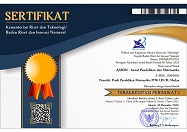KEMAMPUAN MEMBUKTIKAN MAHASISWA CALON GURU MATEMATIKA
Abstract
Abstrak:
Penelitian ini bertujuan untuk menjelaskan pengaruh akreditasi prodi terhadap kemampuan mahasiswa pendidikan matematika dalam membaca, mengklasifikasikan, dan mengkonstruksi bukti matematis. Penelitian ini merupaan penelitian ex post facto dengan pendekatan kuantitatif. Populasi penelitian ini adalah mahasiswa pendidikan matematika di Yogyakarta tahun ajaran 2016/2017 yang menempuh masa studi 3 tahun pertama. Sampel penelitian ini yaitu 386 mahasiswa dengan kategori akreditasi prodi A dan B. Instrumen penelitian ini terdiri dari tes kemampuan membaca, mengklasifikasi, dan mengkonstruksi bukti matematis. Hasil penelitian menunjukkan bahwa faktor akreditasi memberikan perbedaan yang signifikan pada mahasiswa prodi terakreditasi A dan B dalam membaca, mengklasifikasi, dan mengkonstruksi bukti matematis. Kemampuan membaca, mengklasifikasi, dan mengkonstruksi bukti matematis mahasiswa berbanding lurus dengan akreditasi prodi. Dengan demikian semakin baik akreditasi prodi pendidikan matematika maka semakin baik pula kemampuan mahasiswanya dalam membaca, mengklasifikasi, dan mengkonstruksi bukti matematis.
Kata Kunci:
Akreditasi, Bukti Matematika, Membaca, Mengklasifikasi, Mengkonstruksi
Abstract:
This study aims to explain the effect of study programs accreditation on mathematics education students ability in reading, classifying, and constructing mathematical proof. This study was ex post facto with quantitative approach. The study populations was students mathematics education students at Yogyakarta in the academic year 2016/2017 who studying in the first 3 years. The research samples included 386 students with study programs accreditation categories A and B. This research instruments consist of reading skills tesr, classifying skills test, and constructing skills test of mathematical proof. The results showed that accreditation of study programs have a significant influence in study programs students of A and B accreditations. The skills of reading, classifying, and constructing mathematical proof was directly proportional to the accreditation of study programs. Therefore, the better accreditation of mathematics education study programs can make the better students skills in reading, classifying, and constructing mathematical proof.
Keywords:
Accreditation, Mathematics Proof, Reading, Classifying, Constructing
Full Text:
PDF (Indonesian)References
Aitken, N. D. (1982). College student performance, satisfaction and retention: Specification and estimation of a structural model. The Journal of Higher Education, 53(1), 32-50. doi: 10.1080/00221546.1982.11780423.
Alcock, L., & Wilkinson, N. (2011). e-Proofs: Design of a resource to support proof comprehension in mathematics. Journal of The International Society For Design and Development in Education. 1(4), 1-19.
Almeida, D. (2000). A Survey of Mathematics Undergraduates' Interaction with Proof: Some Implication for Mathematics Education. International Journal of Mathematical Education in Science and Technology. 31(6), 869-890. doi: 10.1080/00207390050203360.
Altares, P. S., Copo, A. R. I., Gabuyo, Y. A., Laddaran, A. T., Mejia, L. D. P., & Policapio, I. A., ... & Yao, A. M. S. D. (2003). Elementary statistics: a modern approach. Rex Bookstore Inc., Philippines.
De Villiers, M. D. (1990). The role and function of proof in mathematics. Pythagoras, 24, 17-24.
Freitag, M. (1997). Reading and Writing in the Mathematics Classroom. The Mathematics Educator. (8) (1) (16-21).
Gray, E., Pinto, M., Pitta, D., & Tall, D. (1999). Knowledge construction and diverging thinking in elementary & advanced mathematics. In Tirosh, D. (Eds.), Forms of Mathematical Knowledge. Springer: Dordrecht.
Hanna, G., & Jahnke, H. N. (1996). Proof and proving. In: Bishop A.J., Clements K., Keitel C., Kilpatrick J., Laborde C. (Eds.), International Handbook of Mathematics Education. Kluwer International Handbooks of Education, vol 4. Springer, Dordrecht.
Hermida, D. (2009). The importance of teaching academic reading skills in first-year university courses. The Importance of Teaching Academic Reading Skills In First-Year University Courses (June 14, 2009). Retrieved from SSRN: https://ssrn.com/abstract=1419247 or http://dx.doi.org/10.2139/ssrn.1419247.
Hutabarat, W. (2015). The impact of organizational culture, organizational structure, and job-satisfaction on high school teachers job-performance. Jurnal Cakrawala Pendidikan, 34(03), pp. 412-420. doi: 10.21831/cp.v3i3.7357.
Imamoglu, Y., & Togrol, A. Y. (2015). Proof Construction and Evaluation Practices of Prospective Mathematics Educators. European Journal of Science and Mathematics Education, 3(2), pp. 130-144.
Inglis, M., & Alcock, L. (2012). Expert and novice approaches to reading mathematical proofs. Journal for Research in Mathematics Education, 43(4), pp. 358-390. doi: 10.5951/jresematheduc.43.4.0358.
Mejia-Ramos, J. P., & Weber, K. (2014). Why and how mathematicians read proofs: Further evidence from a survey study. Educational Studies in Mathematics, 85(2), pp. 161-173. Doi: 10.1007/s10649-013-9514-2Muijs, D. & Reynolds, D. (2017). Effective teaching: Evidence and practice 4th ed. London: Sage.
NCTM, P. (2000). Principles and Standards for school Mathematics. Reston, VA, Author.
Novanto, Y. & Yulianti L. (2015). Faktor-faktor yang berkaitan dengan prestasi akademik mahasiswa sekolah tinggi teologi "x". Paper Presented at the Conference paper: Konferensi Nasional Psikologi UPH Revolusi Mental, Surabaya, Indonesia, Retrieved from https://www.researchgate.net/publication/283352540_FAKTOR_-_FAKTOR_YANG_BERKAITAN_DENGAN_PRESTASI_AKADEMIK_MAHASISWA_SEKOLAH_TINGGI_TEOLOGI_X.
Permendiknas 2006 No. 22, Standar Isi untuk Satuan Pendidikan Dasar dan Menengah.
Permenristekdikti 2016 No. 32, Akreditasi Program Studi dan Perguruan Tinggi.
Pfeiffer, K. (2010). The Role of Proof validation in Student' Mathematical Learning. MSOR Connections. 10(2), pp. 17-21.
Pike, G. (1991). The Effects of Background, Coursework, and Involvement on Students Grades and Satisfaction. Research in Higher Education, 32(1), pp.15-31. doi: 10.1007/BF00992830
Polya, G. (1981). Mathematical discovery. New York, NY: John Wiley & Sons.
Qohar, A. (2009). Pemahaman Matematis Siswa Sekolah Menengah Pertama pada Pembelajaran dengan Model Reciprocal Teaching. Paper presented at the Seminar Nasional Matematika dan Pendidikan Matematika 2009. Jurusan Pendidikan Matematika FMIPA UNY.
Rav, Y. (1999). Why do we prove theorems?. Philosophia mathematica, 7(1), pp. 5-41. doi: 10.1093/philmat/7.1.5.
Rinala, I. N., Yudana, I. M., & Natajaya, I. N. (2013). Pengaruh Kualitas Pelayanan Akademik Terhadap Kepuasan dan Loyalitas Mahasiswa Pada Sekolah Tinggi Pariwisata Nusa Dua Bali. Jurnal Administrasi Pendidikan, 4(1).
Samosir, Z. Z. (2005). Pengaruh kualitas pelayanan terhadap kepuasan mahasiswa menggunakan perpustakaan USU. Jurnal Studi Perpustakaan dan Informasi, 1(1), pp. 28-36
Schoenfeld, A. H. (2012). Problematizing the didactic triangle. ZDM, 44(5), pp. 587-599. doi: 10.1007/s11858-012-0395-0.
Selden, A., & Selden, J. (2003). Validations of proofs considered as texts: Can undergraduates tell whether an argument proves a theorem?. Journal for research in mathematics education, 34(1), pp. 4-36. doi: 10.2307/30034698.
Steele, M. D., & Rogers, K. C. (2012). Relationships between mathematical knowledge for teaching and teaching practice: the case of proof. Journal of Mathematics Teacher Education, 15(2), pp. 159-180. doi: 10.1007/s10857-012-9204-5.
Stylianides, A.J. & Stylianides, G.J. (2009). Proofs construction and evaluation. Educational Studies in Mathematics. 72(2), pp. 237-253. doi: 10.1007/s10649-009-9191-3.
Suryana, A. (2012). Kemampuan Berpikir Matematis Tingkat Lanjut (Advanced Mathematical Thinking) dalam matakuliah Statistika Matematika 1. Prosiding Seminar Nasional Matematika dan Pendidikan Matematika FMIPA UNY, pp. 37-48.
Syaban, M. (2009). Menumbuhkembangkan Daya dan Disposisi Matematis Siswa Sekolah Menengah Atas Melalui Pembelajaran Investigasi. Jurnal Pendidikan, 3(2), pp. 129-136.
Tall, D. (1991). Advanced mathematical thinking. Mathematics Education Library. Dordrecht: Kluwer Academic Publishers Group.
Weber, K. (2001). Student Difficulty In Constructing Proofs: The Need For Strategic Knowledge. Educational Studies in Mathematics. 48(1), pp. 101-119. doi: 10.1023/A:1015535614355.
Weber, K. (2015). Effective proof reading strategies for comprehending mathematical proofs. International Journal of Research in Undergraduate Mathematics Education, 1(3), pp. 289-314. doi: 10.1007/s40753-015-0011-0.
Weber, K., & Mejia-Ramos, J. P. (2011). Why and how mathematicians read proofs: An exploratory study. Educational Studies in Mathematics, 76(3), pp. 329-344. doi: 10.1007/s10649-010-9292-z.
Wilkerson-Jerde, M.H. & Wilensky, U.J. (2011). How Do Mathematicians Learn Math?: Resources And Acts For Constructing And Understanding Mathematics. Educational Studies in Mathematics. 78, pp. 21-43. doi: 10.1007/s10649-011-9306-5.
Yang, K. L. (2015, 11-15 May). Past and future of research on mathematical reading related to proofs. Paper Presented at the 7th ICMI-East Asia Regional Conference on Mathematics Education, pp. 87-96.
Yang, K. L., & Lin, F. L. (2008). A model of reading comprehension of geometry proof. Educational Studies in Mathematics, 67(1), pp. 59-76. doi: 10.1007/s10649-007-9080-6.
DOI: http://dx.doi.org/10.30821/axiom.v9i1.7236
Refbacks
- There are currently no refbacks.
Copyright (c) 2020 Diena Frentika, Sugiman Sugiman, Heru Tri Novi Rizki

This work is licensed under a Creative Commons Attribution-ShareAlike 4.0 International License.
p-ISSN: 2087-8249 | e-ISSN: 2580-0450
Indexed by:
AXIOM : Jurnal Pendidikan dan Matematika is licensed under a Creative Commons Attribution-ShareAlike 4.0 International License.











